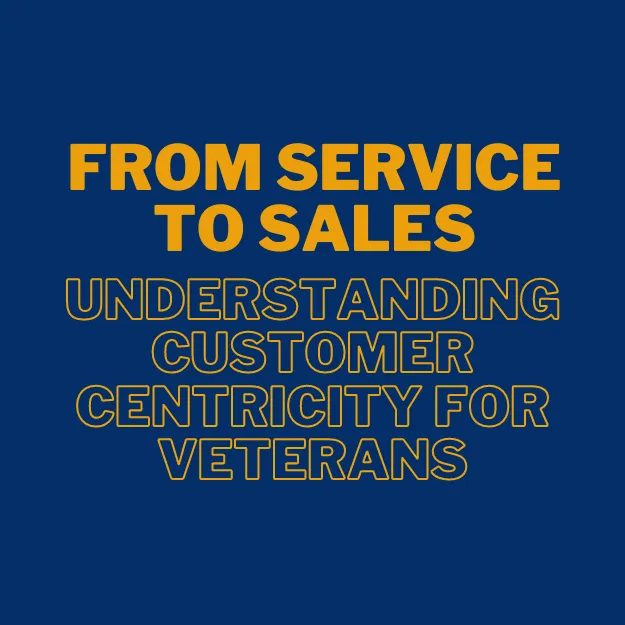
Why choose to walk the road alone when you can have a mentor who's been where you want to go?

From Service to Sales: Understanding Customer Centricity for Veterans
From Service to Sales: Understanding Customer Centricity for Veterans
Transitioning from a military career to entrepreneurship presents unique challenges and opportunities. For veteran entrepreneurs, leveraging the discipline, leadership, and strategic skills honed in the military can be a significant advantage in the business world. However, one area that often requires a new perspective is customer centricity. This post explores how veterans can apply their service-oriented mindset to prioritise and excel in customer-centric business practices.
Understanding Customer Centricity

Customer centricity is about placing your customers at the heart of your business strategy. It’s a philosophy that goes beyond providing excellent customer service; it’s about designing your entire business process around the needs, preferences, and feedback of your customers. For veterans, this approach can be likened to mission planning and execution, where understanding the objective and the environment is crucial for success.
The Military Connection

In the military, success often depends on understanding the mission's context, the team's capabilities, and the objective. Similarly, in business, understanding your customer's needs, preferences, and the market landscape can determine your success. The strategic planning, adaptability, and teamwork ingrained in military service are directly transferable skills that can enhance your approach to building a customer-centric business.
Implementing Customer Centricity

Strategic Planning: Start with research. Understand who your customers are, what they need, and how they want to be served. This involves gathering data through surveys, feedback, and market analysis, much like reconnaissance missions provide critical intelligence.
Operational Excellence: Use your logistical and operational skills to streamline processes with the customer in mind. This could mean simplifying the purchasing process, ensuring product quality, or reducing response times. Operational excellence in the military often means efficiency and effectiveness, principles that are equally valuable in ensuring customer satisfaction.
Leadership and Teamwork: Lead your team with a clear focus on the customer. Encourage feedback, foster open communication, and build a culture where every team member understands their role in delivering value to the customer. Just as leadership in the military involves inspiring and guiding your team towards a common goal, the same applies to motivating your team to prioritise customer needs.
Case Studies and Success Stories
Veteran entrepreneurs are uniquely positioned to leverage their service-oriented mindset and discipline into successful business strategies, particularly in the realm of customer centricity. The following case studies and success stories highlight how veteran-owned businesses have excelled by placing the customer at the heart of their operations, demonstrating the power of integrating military values with business acumen.
Case Study 1: The Community-Centric Coffee Shop
Overview: Founded by a group of veterans, "ValoUr Brew" is a coffee shop located in the heart of a bustling city. Recognizing the importance of community and camaraderie experienced during their military service, the owners decided to replicate this environment within their establishment.
Challenge: In a market saturated with chain and independent coffee shops, Valour Brew needed to differentiate itself and build a loyal customer base.
Strategy: The founders implemented a customer-centric approach by actively soliciting feedback from patrons and involving them in the decision-making process. They introduced community events such as veteran storytelling evenings, live music nights, and art displays from local artists, all based on customer suggestions.
Outcome: Valor Brew quickly became a community hub, not just for veterans but for the wider community, fostering a sense of belonging and loyalty among its customers. This approach led to increased foot traffic, higher customer retention rates, and significant growth in word-of-mouth referrals.
Case Study 2: The Adaptive Tech Start-up
Overview: "TechTactical" is a tech start-up founded by veterans specializing in cybersecurity solutions. Drawing on their military background in intelligence and surveillance, the founders understood the importance of adaptability and customisation in operations.
Challenge: TechTactical faced the challenge of entering a highly competitive market where off-the-shelf solutions were the norm.
Strategy: The company decided to focus on customisable solutions that could be tailored to meet the specific needs of each client. They developed a customer feedback loop that allowed for continuous product improvement and also provided free cybersecurity awareness training for their clients' employees.
Outcome: TechTactical's commitment to customer-centric innovation resulted in securing contracts with several large corporations and government entities. Their approach not only addressed the unique security needs of each client but also built strong, trust-based relationships, positioning TechTactical as a leader in customer-focused cybersecurity solutions.
Success Story: GreenZone Gardening
Overview: GreenZone Gardening is a veteran-owned landscaping and garden design business that has made customer centricity its core principle. The founder, a former military engineer, applied his problem-solving skills and attention to detail to the landscaping industry.
Challenge: GreenZone faced the challenge of establishing a new business in a competitive local market dominated by long-standing companies.
Strategy: The business differentiated itself by offering personalised garden designs that reflected the individual style and needs of each customer. They implemented a thorough consultation process to understand their clients' desires deeply and provided flexible maintenance plans tailored to each garden's specific requirements.
Outcome: GreenZone Gardening's dedication to meeting and exceeding customer expectations led to rapid growth through glowing customer reviews and referrals. Their approach not only won them numerous awards for garden design but also established a loyal customer base that appreciates the personalized and attentive service.
Conclusion: These case studies and success stories from veteran-owned businesses illustrate the significant impact of customer centricity on business success. By integrating the values learned in military service, such as discipline, adaptability, and a service-oriented mindset, with a deep understanding of their customers' needs, these entrepreneurs have built businesses that not only thrive but also contribute positively to their communities and industries.
Conclusion
For veteran entrepreneurs, the transition from service to sales does not mean leaving behind the values and skills developed in the military. Instead, it offers an opportunity to apply these strengths in new ways. By understanding and implementing customer centricity, veterans can build businesses that not only succeed financially but also forge strong, lasting connections with their customers.
Call to Action (CTA)
Embracing customer centricity is a journey that requires commitment, flexibility, and continuous learning. For veteran entrepreneurs ready to take their business to the next level, consider:
Joining a workshop or seminar focused on customer experience strategies.
Engaging with a mentor or business coach specialising in customer-centric business models.
Implementing one change in your business this month that places a greater focus on your customers.

What Others Are Saying

James Wood, Sales Rep

John Stepson, Business Owner

Mark Hamilton, Sales Director
Since joining a few months ago,
I have found Antony to be both extremely informative but also very interesting and he has really made me think about how I approach sales,
leading to some great results.
Working with the Ex Military Mentor was nothing short of transformative for my business. His one-to-one coaching sessions provided me with actionable strategies that helped me tackle the challenges I was facing head-on. I especially appreciated his approach to leadership, which is clearly honed from years of diverse experience. He's not just another coach; he's a mentor in the truest sense.
I've attended numerous workshops over the years, but the Ex Military Mentor's stood out by a mile. The exercises were hands-on, the lessons learned were immediately applicable, and the atmosphere was one of genuine teamwork. It's clear he knows what it takes to succeed in both the battlefield and the boardroom. His insights into resilience and teamwork have significantly improved my sales team's performance.
Meet Your Mentor

Antony Draper
Ex Military Mentor
Meet your mentor, a seasoned veteran not just of the military but also of the business world. With an extensive background that spans from parachute jumps and war deployments between 1994 and 2005, to strategic roles at HP, Capita, Socitm Advisory, The Logic Group, Public Sector, his expertise is hard-won and diverse. In a quest to make the transition from military to civilian life smoother for others, he even founded a company dedicated to that very cause. Although the business venture did not succeed, it became a cornerstone experience in understanding what not to do—equally invaluable.
Today, as the Ex Military Mentor, he brings to the table a rare combination of leadership, resilience, and practical business know-how. His coaching services, webinars, and workshops are designed to empower business owners and sales leaders with insights and actionable strategies, deeply influenced by his military and corporate backgrounds.
As a recognised authority on topics like Leadership, Business Growth, and the Sandler Sales Framework, he's not just a coach but a thought leader who's shaping modern perspectives on business excellence. He is also an ambassador for the Cheltenham Business Growth Network and a member of prestigious networking groups like FORE Business and B2B Network Gloucester. So, when you're learning from him, you're learning from someone who's been there, done that, and is still doing it successfully
2024 ExMilitaryMentor.com
